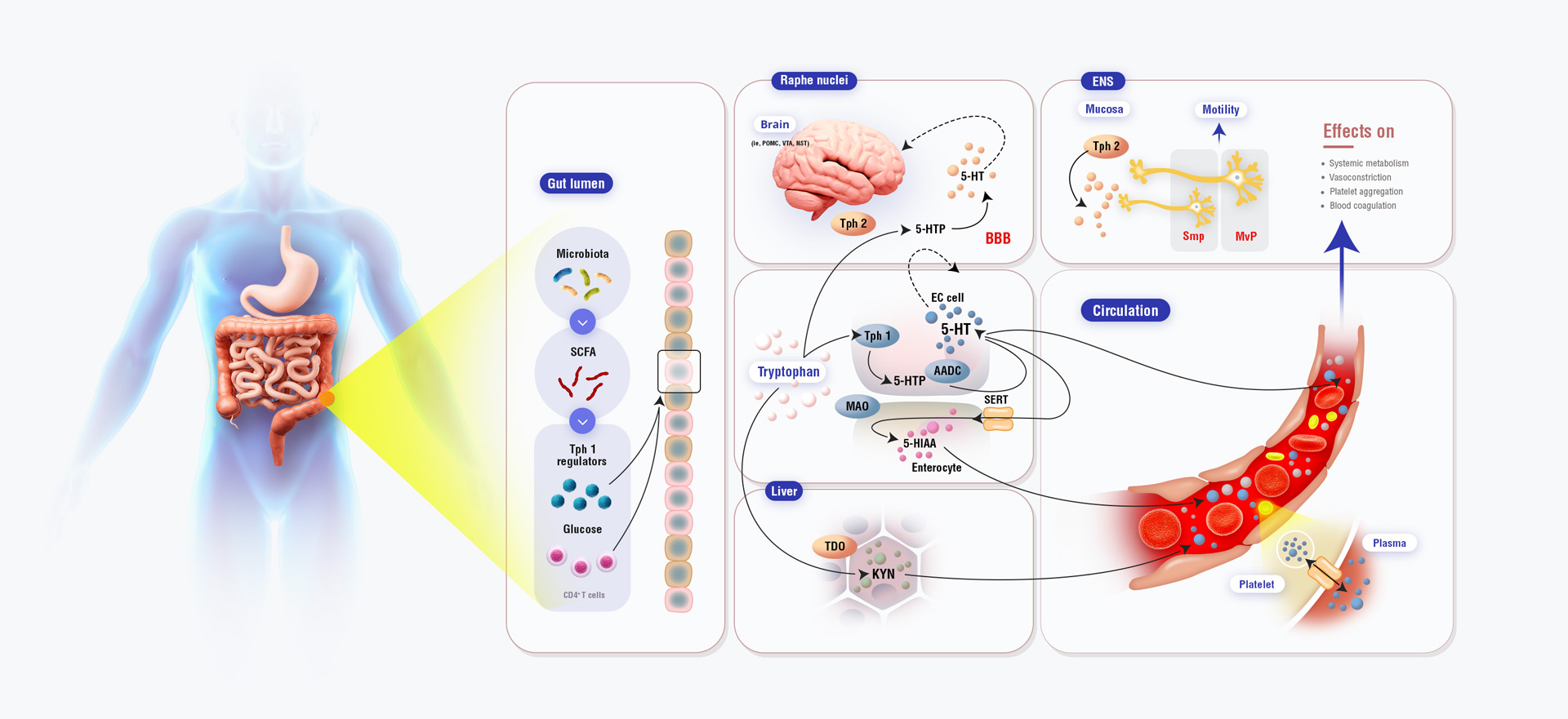Gut Health, Well-Being, and More: The Essential Role of Serotonin in the Body
Serotonin, popularly known as the “happiness hormone,” is a fundamental…
Continue reading


Serotonin, popularly known as the “happiness hormone,” is a fundamental neurotransmitter for well-being. In addition to directly influencing mood, this substance also plays an essential role in regulating sleep, appetite, and cognitive functions.
Interestingly, about 90% of the body’s serotonin is produced in the gut. This means that intestinal health can directly influence how we feel on a daily basis.
Maintaining adequate levels of this neurotransmitter is crucial for preventing conditions such as depression and anxiety. Research indicates that serotonin deficiency may be associated with behavioral and mood changes.
Therefore, understanding how serotonin works and how to influence its production can be an important step toward achieving greater balance and quality of life.
Would you like to learn more about how serotonin impacts your body and mind? Keep reading to discover valuable insights into this neurotransmitter and its influence on daily life.
Serotonin (5-hydroxytryptamine, 5-HT) is a neurotransmitter and hormone derived from the amino acid tryptophan, widely distributed in the central nervous system (CNS), the gastrointestinal tract, and the cardiovascular system. In the CNS, it plays a crucial role in regulating mood, sleep, appetite, cognition, and stress response (1, 2).
Beyond its function as a neurotransmitter, serotonin acts as an important physiological mediator in the gastrointestinal tract, influencing intestinal motility, fluid secretion, and sensory perception.
Approximately 90% of the body’s serotonin is produced in the gut, where it also participates in brain-gut communication via the gut-brain axis. This interaction highlights serotonin as a key element in regulating various bodily functions beyond the central nervous system (2, 3).
Serotonin is an essential neurotransmitter that regulates multiple functions in both the central nervous system and the gastrointestinal tract. About 95% of the body’s serotonin is found in the gastrointestinal tract, with 90% stored in enterochromaffin cells (ECs), which release this mediator in response to mechanical or chemical stimuli (4-6).
Specialized enteroendocrine cells called enterochromaffin cells (ECs) are primarily responsible for serotonin production in the intestine. These cells act as sensors of the gut lumen and can respond to a variety of ingested nutrients, as well as to the gut microbiota and its associated metabolites (7).
Once released into the bloodstream, serotonin is quickly taken up by the serotonin transporter (SERT) and stored in platelet dense granules, where it can be released as needed (8).
Unlike its precursor tryptophan, serotonin does not cross the blood-brain barrier. Therefore, in the CNS, it must be synthesized locally by serotonergic neurons (9).
Serotonin’s biological activity occurs through interaction with various receptor subtypes, classified according to their structures, molecular mechanisms, and pharmacological profiles. These receptors are widely distributed throughout the gastrointestinal tract, where they play fundamental roles in regulating sensory, motor, and secretory functions (6).
An increased synaptic availability of serotonin in the central nervous system is associated with elevated mood and reduced anxiety (10).
In the digestive tract, serotonin released by ECs modulates intestinal motility, fluid secretion, and visceral pain perception, acting through the enteric nervous system (ENS) and the autonomic nervous system. The ENS, located in the myenteric and submucosal plexuses, can operate independently of the CNS due to the presence of Intrinsic Primary Afferent Neurons (IPANs), which coordinate local reflex responses. Meanwhile, the extrinsic innervation of the intestine is mediated by the parasympathetic and sympathetic nervous systems, integrating signals between the brain-gut axis (5).
We can summarize the main functions of serotonin in:
Additionally, serotonin mediates numerous non-neuronal processes, such as bladder function, respiratory drive, hemostasis, vascular tone, immune function, and intestinal inflammation (11-15).

Serotonin is an important neurotransmitter, growth factor, and hormone that mediates a wide range of physiological functions (7). Several factors can affect its levels in the body (7, 16):
Diet: Serotonin is synthesized from the amino acid tryptophan, which is found in foods such as turkey, salmon, eggs, tofu, and nuts. Consuming a diet rich in tryptophan can enhance serotonin production. Additionally, carbohydrate intake aids in tryptophan absorption by the brain, promoting its conversion into serotonin.
Regular Physical Exercise: Aerobic activities such as running, cycling, or swimming can boost serotonin production in the brain, contributing to improved mood and overall well-being.
Sunlight Exposure: Daily exposure to sunlight, especially in the morning, can increase serotonin synthesis, regulating mood and circadian rhythms.
Gut Microbiota: Since approximately 90% of the body’s serotonin is produced in the gut, maintaining a healthy gut microbiota is crucial. A diet rich in fiber, fruits, vegetables, and probiotics can promote gut health and, consequently, influence serotonin levels. Read more about the importance of gut microbiota here on our blog.
Genetics: Genetic variants in the serotonin transporter gene (SLC6A4) can affect the function and regulation of this neurotransmitter, influencing susceptibility to mood disorders and other conditions.
Stress and Sleep Quality: Chronic stress and sleep deprivation can reduce serotonin production, negatively affecting mood and overall health.
Carcinoid Syndrome: The presence of carcinoid tumors is associated with increased serotonin levels.
Adopting a healthy lifestyle that includes a balanced diet, regular physical exercise, and stress management practices can promote serotonin production and help maintain adequate levels in the body.
Serotonin is involved in various health conditions, acting in the central nervous system, gastrointestinal system, and liver. Changes in serotonin levels have been linked to gastrointestinal disorders, neurological and psychiatric diseases, and liver conditions.
In the gastrointestinal tract, serotonin plays a crucial role in regulating visceral pain, secretion, and the activation of the peristaltic reflex. Consequently, its dysregulation is directly associated with functional disorders such as Irritable Bowel Syndrome (IBS).
Additionally, the gut microbiota influences the expression of the serotonin transporter (SERT), which can contribute to conditions like chronic constipation and impact gut-brain communication (17-19).
In the central nervous system, serotonin is strongly linked to psychiatric disorders, including anxiety, depression, obsessive-compulsive disorder, and phobias (17, 18).
Studies suggest that gut dysbiosis may also be associated with these conditions, as the gut microbiota can modulate serotonergic signaling and influence the development of major depressive disorder and anxiety disorders (20-23).
Moreover, serotonin plays a significant role in the liver, being involved in the progression of liver fibrosis and the pathogenesis of steatohepatitis.
Evidence indicates that serotonin may act synergistically with Platelet-Derived Growth Factor (PDGF), stimulating the proliferation of hepatic stellate cells (HSC), thereby promoting fibrotic processes in the liver (8).
Thus, alterations in serotonin levels—whether due to central nervous system dysfunctions, gastrointestinal factors, or gut microbiota regulation—can contribute to the development and progression of various diseases, such as IBS and psychiatric disorders (24).
Variants in genes related to serotonin, including serotonin receptors and transporters, as well as tryptophan metabolism, have been associated with increased adiposity and metabolic diseases (25-26).
These genetic variants influence body mass index (BMI) (27), waist circumference (28, 29), and components of metabolic syndrome (29, 30).
Additionally, elevated peripheral serotonin levels have been observed in obese individuals, affecting energy balance and glucose metabolism (31). Gut dysbiosis may also increase serotonin transporter (SERT) expression, contributing to obesity and possibly type 2 diabetes (32).
The serotonin test is a laboratory test that measures the levels of this neurotransmitter in blood or urine. It is used to assist in the diagnosis of certain health conditions related to alterations in serotonin production or metabolism.
A serotonin test may be requested in cases of suspected:
The test can be conducted through blood or urine sample collection. Generally, it is recommended to avoid foods rich in tryptophan (such as bananas, pineapples, nuts, and chocolate) and certain medications before the test, as they may influence the results.
Serotonin plays an essential role in well-being and in regulating various bodily functions. Evaluating serotonin levels can be a valuable tool in diagnosing clinical conditions that affect its production or metabolism.
SYNLAB performs serotonin quantification in serum and urine samples—tests that can help investigate conditions related to the metabolism of this neurotransmitter.
Sample Collection Instructions: To prevent interferences in serotonin levels, it is recommended to avoid consuming, for at least 24 hours before sample collection, plums, dried fruits, chocolate, pineapple, bananas, and mussels, whether in their natural form or in products containing these ingredients.
Accurate and up-to-date testing is essential for precise diagnoses and better treatment guidance. SYNLAB is here to help.
We offer diagnostic solutions with rigorous quality control to the companies, patients, and healthcare providers we serve. Present in Brazil for over 10 years, we operate in 36 countries across three continents and are leaders in diagnostic services in Europe.
Contact the SYNLAB team to learn about our available tests.
References
1. Martin AM, Yabut JM, Choo JM. The gut microbiome regulates host glucose homeostasis via peripheral serotonin. Endocrinology. 2017,158:1049-1063.
2. Stasi C, Sadalla S, Milani S. The Relationship Between the Serotonin Metabolism, Gut-microbiota and the Gut-brain Axis. Current Drug Metabolism, 2019, 20, 646-655.
3. Lesurtel M, Soll C, Clavien Graf and PA. Role of serotonin in the hepato-gastroIntestinal tract: an old molecule for new perspectives. Cell. Mol. Life Sci. 65 (2008) 940 – 952.
4. Kim, D.Y.; Camilleri, M. Serotonin: A mediator of the brain-gut connection. Am. J. Gastroenterol., 2000, 95(10), 2698-2709.
5. Gershon, M.D. Serotonin and its implication for the management of irritable bowel syndrome. Rev. Gastroenterol. Disord., 2003,3(Suppl 2), S25-S34.
6. Stasi C, Bellini M, Bassotti G, Blandizzi C, Milani S. Serotonin receptors and their role in the pathophysiology and therapy of irritable bowel syndrome. Tech. Coloproctol.2014;18:613-21.
7. Jones LA, Sun EW, Martin AM, Keating DJ. The ever-changing roles of serotonin. Int J Biochem Cell Biol. 2020 Aug:125:105776.
8. Lesurtel, M.; Soll, C.; Humar, B.; Clavien, P.A. Serotonin: A double-edged sword for the liver? Surgeon. 2012;10(2):107-113.
9. Papadimas, G.K.; Tzirogiannis, K.N.; Mykoniatis, M.G.; Grypioti, A.D.; Manta, G.A.; Panoutsopoulos, G.I. The emerging role of serotonin in liver regeneration. Swiss Med. Wkly., 2012, 142,w13548.
10. Gershon MD, Tack J. The Serotonin Signaling System: From Basic Understanding To Drug Development for Functional GI Disorders. 2007;132(1):397-414.
11. Ramage AG. The role of central 5-hydroxytryptamine (5-HT, serotonin) receptors in the control of micturition. Br J Pharmacol. 2006;147(Suppl 2):S120–S131.
12. Eilers H, Schumacher MA. Opioid-induced respiratory depression: are 5-HT4a receptor agonists the cure? Mol Interv. 2004;4(4):197–199.
13. Kaumann AJ, Levy FO. 5-Hydroxytryptamine receptors in the human cardiovascular system. Pharmacol Ther. 2006;111(3):674–706.
14. Ghia JE, Li N, Wang H, Collins M, Deng Y, ElSharkawy RT, Cote F, Mallet J, Khan WI. Serotonin has a key role in pathogenesis of experimental colitis. Gastroenterology. 2009;137(5):1649–1660.
15. Li Z, Chalazonitis A, Huang YY, Mann JJ, Margolis KG, Yang QM, Kim DO, Cote F, Mallet J, Gershon MD. Essential roles of enteric neuronal serotonin in gastrointestinal motility and the development/survival of enteric dopaminergic neurons. J Neurosci.2011;31(24):8998–9009.
16. Disponível em: https://www.verywellmind.com/how-to-increase-serotonin-8738613?utm_source=chatgpt.com#toc-understanding-serotonin
17. Crowell MD, Jones MP, Harris LA, Dineen TN, Schettler VA, Olden KW. Antidepressants in the treatment of irritable bowel syndrome and visceral pain syndromes. Curr. Opin. Investig. Drugs, 2004, 5(7), 736-742.
18. Bellini M, Gambaccini D, Bassotti G. Comorbidities in functional gastrointestinal diseases: Do we need a lone ranger or a dream team? Dig. Liver Dis., 2016, 48(5), 562-564.
19. Cao H, Liu X, An Y, Zhou G, Liu Y, Xu M, Dong W, Wang S, Yan F, Jiang K, Wang B. Dysbiosis contributes to chronic constipation development via regulation of serotonin transporter in the intestine. Sci. Rep., 2017, 7(1), 10322.
20. Kelly, J.R.; Clarke, G.; Cryan, J.F.; Dinan, T.G. Brain-gutmicrobiota axis: Challenges for translation in psychiatry. Ann. Epidemiol., 2016, 26(5), 366-372.
21. Pigrau, M.; Rodiño-Janeiro, B.K.; Casado-Bedmar, M.; Lobo, B.; Vicario, M.; Santos, J.; Alonso-Cotoner, C. The joint power of sex and stress to modulate brain-gut-microbiota axis and intestinal barrier homeostasis: Implications for irritable bowel syndrome. Neurogastroenterol. Motil., 2016, 28(4), 463-486.
22. MacQueen, G.; Surette, M.; Moayyedi, P. The gut microbiota and psychiatric illness. J. Psychiatry Neurosci., 2017, 42(2), 75-77.
23. Malan-Muller, S.; Valles-Colomer, M.; Raes, J.; Lowry, C.A.; Seedat, S.; Hemmings, S.M.J. The gut microbiome and mental health: Implications for anxiety- and trauma-related disorders. OMICS, 2018, 22(2), 90-107.
24. Stasi, C.; Rosselli, M.; Bellini, M.; Laffi, G.; Milani, S. Altered neuro-endocrine-immune pathways in the irritable bowel syndrome: The top-down and the bottom-up model. J. Gastroenterol., 2012, 47(11), 1177-1185.
25. Bell CG, Walley AJ, Froguel P. The genetics of human obesity. Nat Rev Genet. 2005;6(3):221–234.
26. Walley AJ, Asher JE, Froguel P. The genetic contribution to non-syndromic human obesity. Nat Rev Genet. 2009;10(7):431–442.
27. Li P, Tiwari HK, Lin WY, Allison DB, Chung WK, Leibel RL, Yi N, Liu N. Genetic association analysis of 30 genes related to obesity in a European American population. Int J Obes. 2014;38(5):724–729
28. Rosmond R, Bouchard C, Bjorntorp P. Increased ¨ abdominal obesity in subjects with a mutation in the 5-HT2A receptor gene promoter. Ann N Y Acad Sci. 2002;967(1):571–575.
29. Halder I, Muldoon MF, Ferrell RE, Manuck SB. Serotonin receptor 2A (HTR2A) gene polymorphisms are associated with blood pressure, central adiposity, and the metabolic syndrome. Metab Syndr Relat Disord. 2007;5(4):323–330.
30. Kring SII, Werge T, Holst C, Toubro S, Astrup A, Hansen T, Pedersen O, Sørensen TI. Polymorphisms of serotonin receptor 2A and 2C genes and COMT in relation to obesity and type 2 diabetes. PLoS One. 2009;4(8):e6696.
31. Young RL, Lumsden AL, Martin AM, Schober G, Pezos N, Thazhath SS, Isaacs NJ, Cvijanovic N, Sun EWL, Wu T, Rayner CK, Nguyen NQ, Fontgalland D, Rabbitt P, Hollington P, Sposato L, Due SL, Wattchow DA, Liou AP, Jackson VM, Keating DJ. Augmented capacity for peripheral serotonin release in human obesity. Int J Obes. 2018;42(11): 1880–1889.
32. Yabut JM, Crane JD, Green AE, Keating DJ, Khan WI, Steinberg GR. Emerging Roles for Serotonin in Regulating Metabolism: New Implications for an Ancient Molecule. Endocr Rev. 2019 Mar 22;40(4):1092–1107.
Serotonin, popularly known as the “happiness hormone,” is a fundamental…
Continue reading
Have you ever felt discomfort after eating certain foods, such…
Continue reading
Dermatomyositis is a rare inflammatory disease that affects the skin…
Continue reading